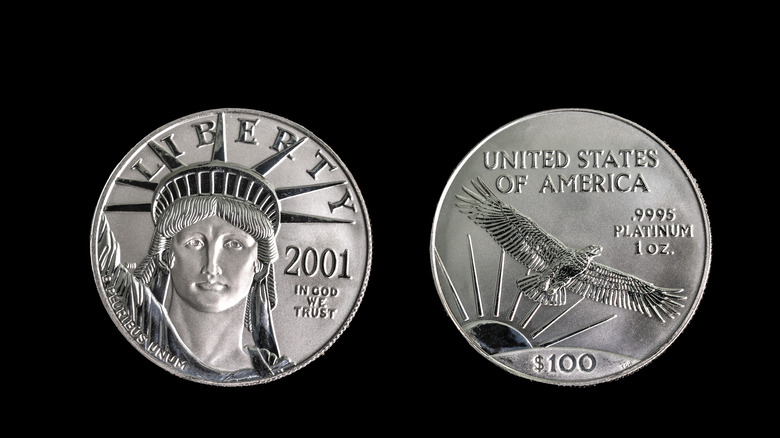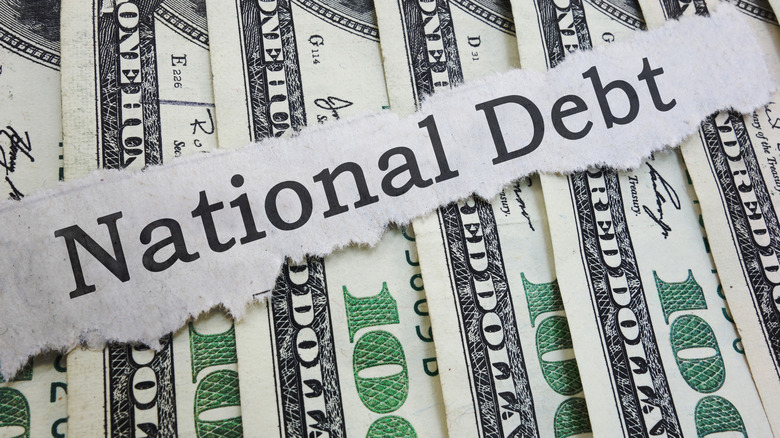What Is The 'Trillion-Dollar Coin'?
The 118th U.S. Congress has had a rocky start, to say the least. The Republicans have a slight majority in the House of Representatives compared to their Democrat counterparts, with 222 Republicans and 212 Democrats, according to CFR. However, a small group of around 20 Republicans caused trouble for the party's leadership when it came to electing a Republican Speaker of the House, something that was eventually settled by a long couple of days of negotiations and 15 House votes, resulting in Kevin McCarthy securing the position (via iHeart).
The majority of the House members in the bloc that prevented McCarthy's victory for so long belonged to the House Freedom Caucus. The group is home to many controversial far-right figures like Lauren Boebert, Matt Gaetz, and others, according to The New York Times. Nonetheless, the group's defiance towards Republican leadership allowed them to gain serious concessions, such as having a strictly fiscal approach to the budget and the debt ceiling, which could cause serious troubles down the road (via Bloomberg). Using the debt ceiling as a tool for hard negotiations is nothing new in the modern political age, some have suggested an unusual solution to the problem; minting the one trillion dollar coin (via Vox).
What is the debt ceiling?
Prior to the enactment of the debt ceiling, the U.S. Congress had free rein to spend as much money as it deemed, something that was constitutionally guaranteed in the 14th Amendment of the Constitution (via U.S. Congress). However, in 1917, Congress created the debt ceiling as a way to create balanced budgets. The idea was that the debt ceiling would prevent Congress from spending recklessly, acting as an ideal budget guide, but nothing actually confined them to the set number, according to Investopedia.
Interestingly enough, Congress can still approve spending that when put into law will exceed the debt limit, however, the treasury won't be able to issue bonds to secure the new funding. Inevitably, as public expenditure has increased with a growing economy, the debt limit has had to be increased 78 times since its inception (via the Department of Treasury). A default would cause an international crisis since new debt would be created that the government can't pay off, and they would be forced to default on their debt. This would cause the United States' credit rating to drop dramatically, making investors warier when buying debt, creating higher interest rates that would create inflation for consumers, less investment in markets, and inability to pay for the military, national parks, and education, Medicare and Medicaid, and a slew of other expenses Americans use in their everyday lives, according to The White House.
The one trillion dollar coin
Given that the enactment of the debt ceiling does not reflect the actual ability of the government to pay off its debts, many critics have supported abolishing the debt ceiling as a whole, claiming that even using the debt ceiling as a political leverage point creates uncertainty in markets, or worse, can actually lead to default (via the Democrats' House Committee). However, as tensions rise on how to wrestle with the debt ceiling, some clever politickers have developed a scheme that could solve the problem (via Vox).
The U.S. government grants the Treasury Secretary the ability to mint any platinum coin at any value they deem acceptable. Theoretically, that means the treasury could create a trillion-dollar coin that would circumvent a default, according to Vox. However, critics warn that this might be the equivalent of creating money to pay off debt, which would lead to massive inflation, according to the The Washington Post. Most policymakers don't actually take the minting of a trillion-dollar coin as a serious policy measure, rather it is used to show the absurdity of the situation. The idea of giving a coin an absurd amount of credit value to bypass an arbitrary statute that is the debt ceiling highlights the urgency for Congress to act now, before it's too late, and every day people across the world face the costs.


